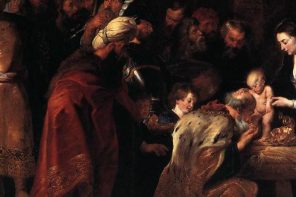Sooner or later, the writer of creative fiction seems bound to ask just how free are my characters?
Good writers strive to make their characters as free as possible – to give them a life of their own – and often report being startled by the things their characters do or say, sometimes in complete defiance of the author’s own scruples. That kind of lifelike freedom is valued in literature and is a hallmark of fine writing. But to what extent can we accomplish this, and on what does it depend?
J.R.R. Tolkien famously described the work of the artist as an act of ‘sub-creation’, echoing the creative work of God the Father. As such, the author’s attempt to ensure the freedom of her characters is comparable to God’s relationship to his human creatures, and likewise raises the whole question of free will ‘versus’ predestination.
If God is all-powerful, all-knowing, our free will can start to look like an illusion – surely, if God’s pulling the strings, we’re bound to a fate not of our choosing. Indeed, Catholic philosopher Peter Kreeft suggests that if God is understood merely as supreme knowledge/power, then the problem of human freedom is most alarming. But, Kreeft reminds us, because God is also, and quintessentially, supreme, divine Love, it is possible for free will and (pre)destination to hang together. The two are both sides of the one coin – God gets his way, so to speak, but in the way he wants, which is by our free will.
To leap from this theological discussion back to creative writing, can we say that a capacity for love is vital for our ability to give free rein to our characters, and so to write better fiction? Obviously, the writer’s ability on this front is not equal to God’s. Even so, our capacity to love others (both real and imagined) seems essential to the writer’s art.
But how do we come to love others? And why should we? How and why do we love the unlovable – the rogues, the bastards, the villains and whores, or simply the jaded (who are so important to a good story), and not just the more affable characters?
By what leap of faith and according to what metaphysics (or spirituality) are we able to love our neighbor as we love ourselves? What is the mode of vision that will enable us to see clearly the truth in others that warrants (and perhaps demands) the loving response? We might go further and ask, what can hinder such a clear vision? And how might we improve it?
It seems to me these are important questions for the creative writer. Further, the importance of such questions reinforces the idea that creative writing is very much a moral activity – not that creative writing makes you a better person, but that the pursuit of creativity entails a continual invitation to virtue. Too often, I think, we hold to some romantic ideal of the creative individual as a kind of rogue spirit, a law unto herself, able to take all kinds of liberties with impunity for the sake of her art. There may be a grain of truth behind that ideal. But with such a conception in mind, I fear, we’re apt to forget that good writing, like all good art, requires a certain un-selfing, an ability to put oneself out of the picture. Or, as novelist and philosopher Iris Murdoch put it, to ‘silence the fat relentless ego’.
Interestingly, Murdoch also maintained that this ability, marked by an attitude she termed ‘the habit of attention’, is central to the moral life.
And so we begin to see that the moral life, our ethics, is part and parcel with our creativity, our life and work as writers/artists. The struggle to write well – to be a maker of good art – is of a piece with the struggle to be good: that is, to see and respond to the world as it truly is.
James Cooper is a writer and teacher of writing and philosophy at Tabor Adelaide in South Australia. He lives on a small rural property with his wife and two sons and hopes soon to publish his first novel.





James, thanks for sharing your ideas,
it’s the first part of your article that intrigues me, that creative fusion between the literal (author) and the literacy (character). Authors who develop relationships with characters tare really reflecting real life. There are some characters we really enjoy working with, and there are others that we find hard to know what to do with.
.
Jasper Fforde (http://www.jasperfforde.com/) is one of the few authors who has playfully and skillfully written about literary characters leading their own lives within books. He explores this interesting mix of who really determines what….and why….
Thanks again for your article
Hi Frank, and thanks for the comments. I’ve heard a lot about Fford lately and mean to check him out, so thanks for the reminder.
You’re right about there being some characters who we enjoy being/working with and others that would be easier to avoid! In a novel I’ve written there’s an abusive father who drinks too much, and I really didn’t want to go there and get to know him. But until I was prepared to do so he came across as flat and lifeless – a space-filler. But he is a central character so I had to find out what makes him tick and let him think and speak and act accordingly. It was hard for me. I’m not an abusive drunk, and neither was my father, so it was a real challenge to get close enough to this character to give him a life of his own (still not sure how successful I’ve been). I certainly learned a lot about myself, especially how my willingness to pre-judge and dismiss others threatens to undermine my writing, which is sort of the broader point I was exploring in this post.
Thanks again!